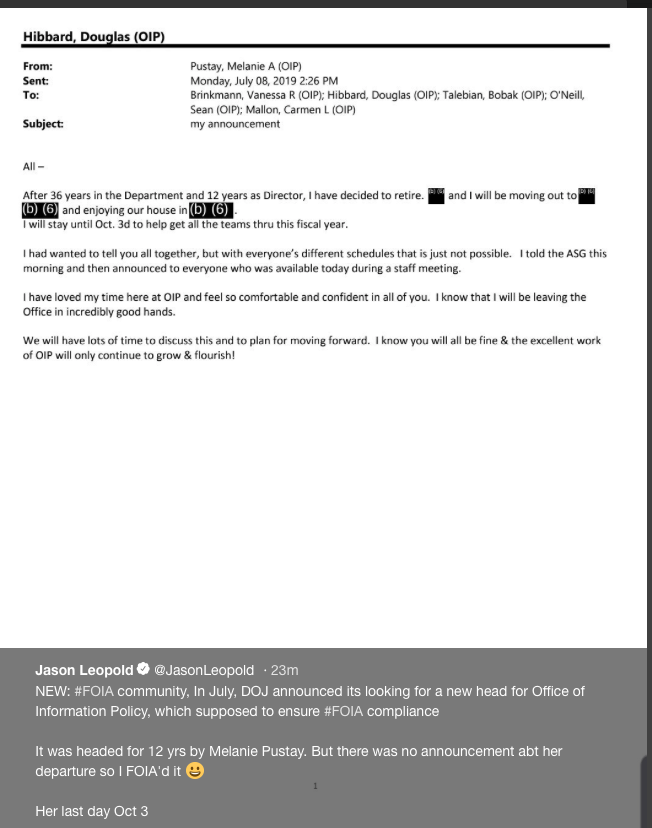In case you missed it, Columbia University Press published a collection of 14 articles last year that examine how freedom of information policies are working, failing, and might be improved. In one of those articles, “Striking the Right Balance: Weighing the Public Interest in Access to Agency Records Under the Freedom of Information Act,” authors Katie Townsend and Adam Marshall argue that all discretionary exemptions -- that is, exemptions other than Exemptions 1, 3, and 4 -- should include a public interest balancing test. That proposal was extended even further by the Anti-Corruption and Public Integrity Act introduced in the U.S. Senate on August 21, 2018 (and now reintroduced in the current Senate by Sen. Elizabeth Warren) and in the U.S. House on November 16, 2018, which would apply a five-factor public interest test to all of the exemptions.
The staff of FOIA Advisor, Allan Blutstein (AB), Kevin Schmidt (KS), and Ryan Mulvey (RM), weigh in on the proposed public interest test.
AB: I have two main objections to these proposals. First, balancing tests often undermine certainty and predictability of the law by tempting decision makers to inject their subjective opinions. That temptation is unavoidable under the Anti-Corruption and Public Integrity Act, which expressly requires agencies and courts to consider “any other factors that the agency or court determines necessary.”
My second objection is a more practical one. It is difficult enough for agencies to accurately determine whether requested records fall within a FOIA exemption -- a largely unappreciated burden that agencies undertook in response to 581,416 requests in fiscal year 2018. The disclosure analysis may soon become more challenging depending on how courts interpret the ambiguous “foreseeable harm” language enacted in 2016. Adding a complicated public interest test to the mix is likely to overburden agencies and courts alike, with Mr. & Mrs. Taxpayer bearing the brunt of increased litigation costs.
KS: I think the practicality issue is a real challenge, so my counter proposal is simply to remove the deliberative process exemption under Exemption 5. Outside of national security issues, that’s going to be the Exemption used for the majority of the withholding that would be potentially challenged under the balancing test. The rationale is simple: taxpayers pay for the the work and are subject to the policies crafted in federal agencies and therefore have an interest in understanding how those policies were made.
I’m also a non-lawyer, so I’d also get rid of attorney-client privilege exemption, but I don’t see that one happening and it surely rankles my colleagues here and lawyers everywhere.
RM: I appreciate the idea of a public interesting balancing test, but like my colleagues I share their objections for many of the same reasons. As an initial matter, the sort of five-factor test that has been proposed in Congress would build on, and not replace, the FOIA Improvement Act of 2016’s “foreseeable harm” standard. That standard was intended by Congress to avoid the technical application of FOIA exemptions, especially when the government seeks to hide embarrassing or politically damaging information. Complicating the FOIA by adding yet another balancing analysis doesn’t make sense to me. We still haven’t figured out how the “foreseeable harm” standard is supposed to work; the courts are still deciding.
And this suggests a deeper criticism. Balancing tests rely too much on the judiciary to ensure that the law is being properly applied. Marshall and Townsend lament the development of FOIA jurisprudence over the past fifty years. But the courts are responsible for that development. Courts have chosen to treat de novo review under FOIA as something special (and seemingly less than de novo!). Courts have chosen to defer to agency declarants. Courts refuse to grant discovery outside of extraordinary circumstances. I have little faith that forcing courts to review an agency’s application of yet another variable analysis is going to advance the cause of open government.
The better approach, I think, would be for Congress to focus on amending the FOIA to include clear statutory rules. Already, a bipartisan group of Senators has proposed redefining the term “confidential” for the purposes of Exemption 4, and they also aim to codify the D.C. Circuit’s ruling in American Immigration Lawyers Association, with the Open and Responsive Government Act of 2019. These are helpful, simple, textual reforms that leave little room for courts to play with the law.
What are some other possible “fixes”? Here are some thoughts: (1) provide more detailed direction for agencies to apply the “foreseeable harm” standard; (2) shorten the “sunset provision” that limits the use of the deliberative process privilege; (3) strengthen the role of the Office of Government Information Services, so that it can provide a real check on the agency appeals process; and (4) reverse the Supreme Court’s elimination of the absolute-qualified privilege distinction in FOIA by re-working Exemption 5. I suspect that this last change could provide the same sort of public interest “safety valve” that Marshall and Townsend want, but without introducing a radical new multi-factor test. Agencies would instead be forced to invoke privileges as any other party in civil litigation.
AB: Since we agree about nixing a public interest test, I’ll move on to some of your own proposals. Transparency advocates have lobbied for decades to eliminate the deliberative process, so you are in good company, Kevin. I am not prepared to go that far yet, but I could support Ryan’s suggestion for a shorter sunset provision -- say five years (borrowing from the Presidential Records Act). OGIS would need a significant boost in funding to handle something other than voluntary and non-binding dispute resolution on the appeals side; the government received 15,559 in fiscal year 2018. How would you feel about a mandatory filing fee to partially subsidize that effort? The Supreme Court’s recent interpretation of the term “confidential” under Exemption 4 could not have simplified the statute more clearly, but I do not object to resuscitating the Byzantine “substantial competitive harm” standard. I’ll pass on permitting a needs-based test to Exemption 5, however, which would be a backdoor public interest test.
KS: I’m not sure how much guidance would help for applying foreseeable harm, but I’m not opposed to trying to see if it helps. I would support a sunset provision, but don’t think it goes far enough. There is far less utility in finding out what the government was up to five years ago as opposed to the same year or two. The empowered OGIS proposals are always fun to tinker with. Can you imagine how DOJ OIP would react if OGIS was given the authority to overturn agency withholdings? I’m in favor of rolling out the proposal for that reason alone. I’d be fine with a flat fee structure, say $10 to $25 per case, to help support it.
RM: It seems to me that five years as a sunset provision for deliberative process is about right. I would even give the government eight years—or the span of a two-term presidential administration. I recognize, Kevin, that you’re all for eliminating deliberative process all together. I’m more on Allan’s side in recognizing that it serves a purpose. At the same time, I’ll be the first to admit how agencies overuse the privilege. I am also skeptical that disclosure of truly deliberative material in many cases is ever likely to harm the underlying interests, say, of insulating agency decision-making from undue interference or avoiding public confusion. I’d be OK with Allan’s suggestion of an additional filing fee for a strengthened OGIS process. As long as it is cheaper than the standard filing fee in the D.D.C.! Congress would need to send more money OGIS’s way, too, but I think it would be worthwhile.

